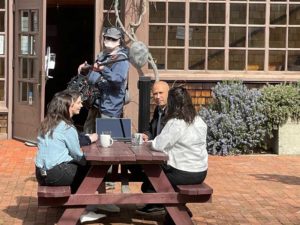“American Insurrection,” a collaboration between Berkeley Journalism’s Investigative Reporting Program, PBS Frontline and ProPublica, has won a George Polk Award, one of the most prestigious honors in journalism.
 The collaboration, honored in the category of National Television Reporting, was one of 15 winners announced on Monday by Long Island University, which administers the Polk Awards. The other winners included The New York Times, Washington Post and the Tampa Bay Times.
The collaboration, honored in the category of National Television Reporting, was one of 15 winners announced on Monday by Long Island University, which administers the Polk Awards. The other winners included The New York Times, Washington Post and the Tampa Bay Times.
“American Insurrection,” a 90-minute documentary and companion 4,500-word article, examined the rise of far-right extremist groups in the United States. The documentary, filmed in the aftermath of the Jan. 6 assault on the U.S. Capitol, traced how these groups evolved in the wake of the deadly 2017 Charlottesville rally, while the article profiled Steven Carrillo, a militia member accused of killing a sheriff’s deputy and a federal court security official in California in 2020.

Ellie Lightfoot (’21), Gisela Pérez de Acha (’20) and Kathryn Hurd (’21).
The article was written by Gisela Pérez de Acha (’20) Kathryn Hurd (’21) and Ellie Lightfoot (’21), and they and their reporting were also featured in the documentary. Lightfoot, Hurd and Perez de Acha worked under the editorial supervision of David Barstow, head of the Investigative Reporting Program and the Reva and David Logan Distinguished Chair in Investigative Journalism. The Carrillo article arose from a story idea by Lecturer David Thigpen, who in 2020 taught a Berkeley Journalism class on covering domestic extremism.
“Over many months of grueling reporting, Gisela, Kathryn and Ellie showed tremendous determination and resilience as they peeled back the layers of Carrillo’s life and uncovered significant new information about his decision to target law enforcement with lethal violence,’’ Barstow said.
 “We could not be more thrilled to learn that the work of our students has been recognized with a Polk Award,” Geeta Anand, dean of Berkeley Journalism, said. “It is testament to the caliber of the mentorship and professional training our students receive in investigative journalism, and the publishing opportunities our students receive.”
“We could not be more thrilled to learn that the work of our students has been recognized with a Polk Award,” Geeta Anand, dean of Berkeley Journalism, said. “It is testament to the caliber of the mentorship and professional training our students receive in investigative journalism, and the publishing opportunities our students receive.”
Hurd, Lightfoot and Perez de Acha began looking at Carrillo and his militia group, the “Boogaloo Bois,” while working as student reporters at the IRP in 2020. (All three have continued to work on other IRP investigations since they graduated.) After months of deep reporting, the team obtained interviews with Carrillo and uncovered a trove of Boogaloo documents.
Hurd, Lightfoot and Pérez de Acha were interviewed on-camera for the documentary. Their article, “How an Active Duty Airman Tried to Start a Civil War,” was published on the FRONTLINE and ProPublica websites.

ProPublica’s A.C. Thompson interviews Gisela Pérez de Acha, Kathryn Hurd and Ellie Lightfoot in the North Gate Hall courtyard in March for “American Insurrection.” (Courtesy: Gisela Pérez de Acha)
“It’s an honor for our work to be recognized by the Polk Awards,” said Hurd. “Our team had the rare privilege of reporting on a true, investigative story under the watchful eye of dedicated mentors. This wouldn’t have been possible without the support of my reporting partners, the commitment of our editor, David, and the backing of the Berkeley Journalism community.”
“Working on this story has been career-defining, and I can’t think of a bigger honor for a budding investigative journalist to receive than the Polk Awards,” said Lightfoot. “Thanks to my fearless reporting partners, editors, and Berkeley’s IRP for making this investigation possible.”
“This story was one of the hardest, yet most gratifying projects I have ever worked on,” said Perez de Acha. “I’m thankful for the opportunity to work alongside incredible reporters like AC Thompson, Rick Rowly and Karim Hajj. I hope this is the first of many collaborations.”
The George Polk Awards were established in 1949 by LIU to commemorate George Polk, a CBS correspondent murdered in 1948 while covering the Greek civil war. The awards, which place a premium on investigative and enterprising reporting that gains attention and achieves results, are conferred annually to honor special achievement in journalism.
